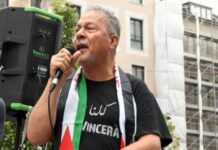
On 21 May, Palestinian prisoners entered their 35th day of hunger strike in the Strike of Freedom and Dignity. Launched by 1500 of the 6500 Palestinian political prisoners in Israeli jails on 17 April 2017, the strike has key demands that focus on basic human rights, including an end to the denial of family visits, proper medical care and treatment, the right to access distance higher education and an end to solitary confinement and administrative detention, imprisonment without charge or trial.
On the 35th day of the strike, hunger strikers’ health continues to face serious challenges and deteriorating conditions. Hunger striking Palestinian prisoners have been subject to intense repression, including frequent abusive and physically taxing transfers, denial of legal and family visits, confiscation of personal belongings, including the salt that strikers rely on with water to preserve their lives and health, and repressive raids by Israeli occupation forces on a frequent basis.
Meanwhile, the strike’s media committee officially declared that no negotiations have taken place with the leadership of the strike on the strikers’ demands, despite the hunger strike of over one month. The media committee declared that reports of negotiations are rumors being spread by the Israel Prison Service in an attempt to undermine the morale of the strikers and public attention and support for the strike at this urgent moment.
The Prisoners’ Affairs Commission and Palestinian Prisoners Society noted the desire of the Israeli government to end the strike before U.S. president Donald Trump arrives in the region and is attempting to isolate the strike’s leadership and neutralize its power through avoiding negotiating directly with the leadership chosen by the prisoners themselves.
A number of hunger strikers are experiencing severe weight loss, fatigue, inability to stand, blurred vision and even vomiting blood. While some strikers have been transferred to civilian hospitals, including a group transferred from Ashkelon prison to Barzilai hospital, many more are being held in prisons with so-called “field hospitals” created to hide the strikers from view or public access, pressure strikers into breaking their strike and threaten the strikers with forced feeding.
Former long-term hunger striker Samer Issawi was transferred to the Ramle prison clinic on Sunday, 21 May after the deterioration of his health. Meanwhile, hunger striker Mohammed Abu Rub told lawyer Khaled Mahajna that 50 hunger strikers are held in Ashkelon prison, where a so-called “field hospital” lacks all medical equipment and only offers glucose to the prisoners who refuse to take it.
Fayha Shalash, the wife of hunger-striking imprisoned journalist Mohammed al-Qeeq – himself a former long-term hunger striker – said that her husband’s health is deteriorating, and that she faces extreme difficulty in obtaining accurate information about her husband’s situation due to the policies of the Israel Prison Service. “There is still uncertainty about the whereabouts of my husband, despite the news we receive about his health….he is one of the most affected among the prisoners in this battle of dignity, because Mohammed has not yet recovered from his first and second hunger strikes,” she said. Reporting what she had been told by a newly released prisoner, she said that “he is a prisoner who has fought two strikes and always calls for collective hunger strikes, so it is not surprising that he participates in this strike.”
Hunger strikers in Ohli Kedar and Eshel prisons issued a message to the world about their continuing strike:
To the masses of our heroic Palestinian people, to the free people and revolutionaries:
We are sending this message with you as we confront with our empty stomach the strongest military power in the Middle East, and we challenge them with our hunger and declare before the world that we will die standing and will not kneel. And we affirm to the steadfast masses of our people that we are continuing our strike until the fulfillment of our just and legitimate demands and that all conspiracies will be destroyed on the rock of our will and steadfastness. The cowardly enemy will see us victorious with the help of God and our will and determination.
To the masses of the Palestinian people…in this moment the jailer practices various types of abuse against us. We call upon all the free people of the world to stand by us and expose this brutal enemy, and we assure our people that we are steadfast until victory.
Throughout Palestine, villages, cities and refugee camps are filled with protests, actions and support tents for the strikers. In Jenin on Saturday, 20 May, former prisoner Lina Jarbouni addressed the participants in the protest tent, urging the escalation of the movement to support the prisoners as they go through this very difficult stage and need popular support more than ever. Jarbouni, freed in April 2017, was the longest-serving Palestinian woman prisoner in Israeli jails. In Ramallah, a women’s march in support of the prisoners included women from villages throughout the area. Saturday events as called for by the National Committee to Support the Strike also included work to implement the boycott of Israeli goods by traders, merchants and people broadly.
On Sunday, various cities conducted a partial strike from 11 am to 2 pm in support of the strike. On Monday, there is a call for a general strike throughout occupied Palestine – in the West Bank, Gaza Strip, Jerusalem, and occupied Palestine ’48 – with participation from the diaspora, with protests starting at 11 am and a one-day hunger strike from 10 am to 10 pm in a national day of anger and protests in response to the presence of U.S. president Trump. On Tuesday, 23 May, the committee is urging marches from the protest tents in all cities and areas, while on Wednesday, 24 May, they are urging night marches in support of the prisoners. The committee is also calling for popular conferences to support the prisoners on Thursday, 25 May and marches to confrontation points with occupation forces after public prayers on Friday, 26 May.
Meanwhile, many Palestinian organizers were sharply critical of the role of the Palestinian Authority in relation to the prisoners’ strike, especially as the PA continues its security coordination with the Israeli occupation despite clear calls for it to end coming from the prisoners’ movement and the Committee to Support the Strike. Abla Sa’adat, Palestinian activist and the wife of hunger striking imprisoned PFLP leader Ahmad Sa’adat said in Sakhnin at a prisoner support tent that PA President Mahmoud Abbas is “wandering from country to country in America, Russia and India as if nothing is happening to our people and our prisoners.”
Palestinian lawyer Muhannad Karajeh of the Addameer Prisoner Support and Human Rights Association said that arrests of Palestinian activists by PA security services have escalated, particularly among university students and after solidarity activities supporting the prisoners’ hunger strike. Multiple activists arrested by the PA security forces told Quds News that they were interrogated about solidarity actions and social media posts in support of the prisoners’ hunger strike.
International actions also continued in support of the prisoners’ strike. Labor for Palestine issued a call for action from workers in support of the prisoners’ strike. The Union of Palestinian Communities and Organizations in Europe held its fourth conference in Berlin on Saturday, 20 May, which it dedicated to the prisoners. Protests continued in Parma, Montreal, Derry, Thionville, Auckland, Bristol, Paris, Copenhagen and elsewhere in support of the prisoners’ strike. Samidoun Palestinian Prisoner Solidarity Network urges further international actions and support for the prisoners at this critical time in their struggle for victory in the Strike of freedom and Dignity.
Discover more from Samidoun: Palestinian Prisoner Solidarity Network
Subscribe to get the latest posts sent to your email.




